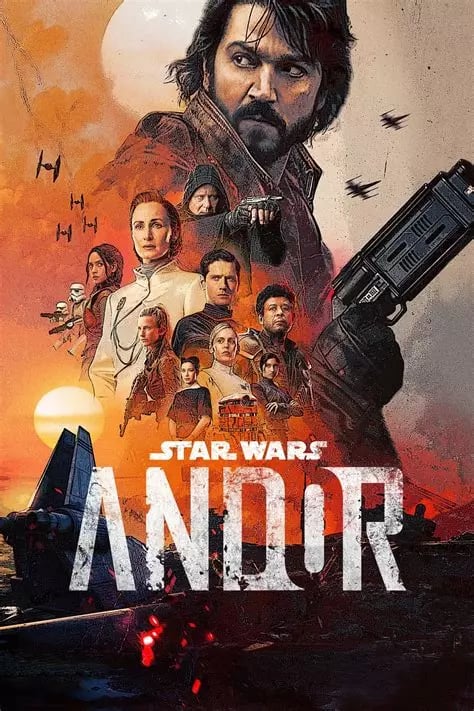In Praise of Andor

On Tuesday we returned from Viet Nam. After being on the road for so long, I was eager to get back to familiar confines. Unfortunately, I came home with a cold.
I’m grateful that my immune system had the courtesy to hold off until it was time to leave Saigon, but the eight-hour flight still turned into a marathon of nose-blowing and Zelda. I spent most of the flight alternating between Tears of the Kingdom and going through an impressive number of tissues, much to the dismay of both my wife and the flight attendant.
The next four days were mostly spent on the couch, drifting in and out of a NyQuil haze. By Saturday, I was starting to feel like myself again and ventured out for a bit.
That downtime gave me the chance to catch up on our topic for today: Andor.
I’ll spare you a long speech about my lifelong fascination with the Star Wars universe, but you should know that I’m deep enough into the lore that I felt some type of way when the Expanded Universe was de-canonized back in 2014.
Admittedly, I am watching this later than most of you. You were smarter than me and all the hype was justified.
Andor is simply remarkable television. It belongs on the prestige tier of TV, right behind the Trinity: The Wire, Breaking Bad, and The Sopranos. It sits in that next level with Mad Men, Deadwood, and The Leftovers and above Lost and BSG. Whatever your understanding of Star Wars may be, and whatever hang-ups you have about science fiction, this is different. It blows the doors off the last trilogy of films and the prequels before them. The current crop of TV series—The Mandalorian, Obi-Wan Kenobi, and others—feel like live-action Saturday morning cartoons. Andor is John le Carré’s Tinker, Tailor, Soldier, Spy in space.
In another timeline, Gilroy, the show runner for Andor, was handed the keys to the Star Wars universe before the sequel films launched, and the people in that timeline are better off and happier than we are because of it.
Andor might be the most intentional television show I have ever watched. The sets are not CGI filled messes nor green screen nonsense but massive, fully built locations. The costumes are intricate and purposeful. In Season 1, Gilroy created an entire world on the planet Ferrix, Andor’s home, populated by working-class people living under the heel of Imperial rule. They serve, in effect, as the Imperial Mechanical Corps. The season ends with an unforgettable rebellion sparked at the funeral of the local matriarch. Every moment feels deliberate and lived in, without the sloppy planet-hopping that plagues the sequel trilogy.
In Season 2, after Andor flees Ferrix, we are immersed in an entirely different culture on Ghorman, a planet that feels like a mix of revolutionary France and a Venetian merchant society. Its people are artisans, known throughout the galaxy for their craftsmanship and textiles.
The plot of Season 2 could not be more timely.
Ghorman is home to an important mineral resource the Empire wants. To secure it, the Empire conspires to build and fund an insurgency campaign, stirring up an uprising among the Ghormans. This unrest provides the Empire with a pretext for a violent crackdown and a genocidal campaign against the people. Meanwhile, the Empire denies both its territorial ambitions and the genocide to the rest of the galaxy. As an organ of propaganda, state media paints the Ghormans as violent thugs committing unprecedented acts of brutality and barbarism, as they are slaughtered by the thousands.
I'm gonna let you sit with that part for a little bit.
The Empire uses (ripped from our own headlines) kettling tactics against the Ghormans that US police deploy against protestors. They infiltrate their networks and employ agent provocateurs to incite crowds. They lie to the world and blame the people they slaughter for resisting.
Without spoiling too much, my favorite plotline involves two regime loyalists. Their story exposes a truth many of us are still in deep denial about: Authoritarian systems create in-groups and out-groups. Too many people today mistakenly believe they belong to the favored group when in reality, they are simply not in the out-group yet.
The fascists eventually come for everyone.
Science fiction at its best provides a space where authors can explore deeper societal issues within safer confines. Take Dune by Frank Herbert, for example, which uses its desert planet and struggle for a precious resource to reflect on Western imperialism and the exploitation of energy in the Middle East. Or Ursula K. Le Guin’s The Left Hand of Darkness, which challenges our understanding of gender and politics through a society with fluid identities.
Andor arrives at a time when fascism is no longer a distant threat. It’s here in the US and under-writes genocides elsewhere. This series asks you to consider a hard question: Where’s your red line?
We have two episodes of Season 2 left, and I expect I’ll have more thoughts next week. If you’ve watched and enjoyed Andor, I’d love to hear from you (but don’t spoil it yet). Even if you aren’t a Star Wars fan but are drawn to espionage dramas, I encourage you to give it a shot.
–
This week we posted a new piece on the travelogue about our trip to Louisville and along the Bourbon Trail. Give it a read if you're so inclined.
Also, on the podcast, look for my conversation with Jordan Harper, author of She Rides Shotgun and Everybody Knows. He’s a dope guest and it’s a fun conversation.
Feel free to hit my inbox with your takes. I have my first work meetings of the new academic year tomorrow, and the school year kicks off in earnest next week.
See you next Sunday.